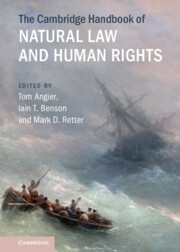Book contents
- The Cambridge Handbook of Natural Law and Human Rights
- The Cambridge Handbook of Natural Law and Human Rights
- Copyright page
- Contents
- Contributors
- Acknowledgements
- Introduction
- Part I Natural Law and the Origins of Human Rights
- Part II Natural Law Foundations of Human Rights Obligations
- 8 Ontological and Epistemological Foundations of Human Rights
- 9 The Teleological Foundations of Human Rights
- 10 New Natural Law Foundations of Human Rights
- 11 A Personalist Foundation for Natural Law and Human Rights
- 12 Acknowledged Dependence, Natural Right, and Human Rights
- 13 Eternal Law, Natural Law, Natural Rights
- Part III Natural Law and Human Rights within Religious Traditions
- Part IV The Human Person, Political Community, and Rule of Law
- Part V Rival Interpretations and Interpretive Principles
- Part VI Challenges and Future Prospects
- Index
10 - New Natural Law Foundations of Human Rights
from Part II - Natural Law Foundations of Human Rights Obligations
Published online by Cambridge University Press: 03 November 2022
- The Cambridge Handbook of Natural Law and Human Rights
- The Cambridge Handbook of Natural Law and Human Rights
- Copyright page
- Contents
- Contributors
- Acknowledgements
- Introduction
- Part I Natural Law and the Origins of Human Rights
- Part II Natural Law Foundations of Human Rights Obligations
- 8 Ontological and Epistemological Foundations of Human Rights
- 9 The Teleological Foundations of Human Rights
- 10 New Natural Law Foundations of Human Rights
- 11 A Personalist Foundation for Natural Law and Human Rights
- 12 Acknowledged Dependence, Natural Right, and Human Rights
- 13 Eternal Law, Natural Law, Natural Rights
- Part III Natural Law and Human Rights within Religious Traditions
- Part IV The Human Person, Political Community, and Rule of Law
- Part V Rival Interpretations and Interpretive Principles
- Part VI Challenges and Future Prospects
- Index
Summary
The New Natural Law Theory (NNLT) identifies the foundations of ethics in practical principles directing agents to aspects of human flourishing in an all-round reasonable manner. Other normative principles and concepts, including the concept of human rights, are understood in terms of their relationship to human flourishing, and the basic human goods that are constitutive aspects of that flourishing. NNLT thus possesses resources to explain the justification and importance of human rights, as well as the role rights talk plays in the overall economy of moral, political, and legal discourse. In this chapter, Section 2 discusses the logic of rights; Section 3 provides the general foundations for the justification of rights, both human and legal, in considerations of justice and common good. Section 4 looks at the paradigm case of human or natural rights: rights that are absolute and thus already conform to the logical structure of rights identified in Section 2. Section 5 identifies the scope of such rights as including all human beings. Section 6 addresses the relationship between human and legal rights. Finally, Section 7 addresses the metaphysical status of human rights.
Keywords
- Type
- Chapter
- Information
- The Cambridge Handbook of Natural Law and Human Rights , pp. 146 - 159Publisher: Cambridge University PressPrint publication year: 2022



